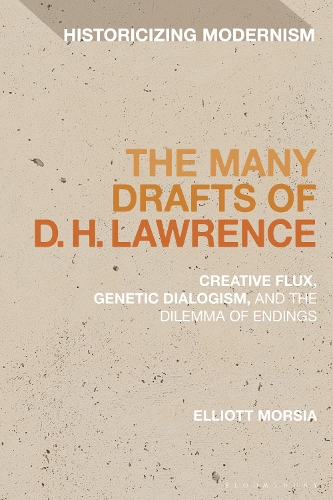
The Many Drafts of D. H. Lawrence: Creative Flux, Genetic Dialogism, and the Dilemma of Endings
(Hardback)
Available Formats
Publishing Details
The Many Drafts of D. H. Lawrence: Creative Flux, Genetic Dialogism, and the Dilemma of Endings
By (Author) Dr Elliott Morsia
Bloomsbury Publishing PLC
Bloomsbury Academic
15th October 2020
United Kingdom
Classifications
Tertiary Education
Non Fiction
Literary studies: c 1900 to c 2000
823.912
Physical Properties
Hardback
256
Width 156mm, Height 234mm
535g
Description
Winner of the DHLSNA Biennial Award for a Book by a Newly Published Scholar Exploring draft manuscripts, alternative texts and publishers typescripts, The Many Drafts of D. H. Lawrence reveals new insights into the writings and writing practices of one of the most important writers of the 20th century. Focusing on the most productive years of Lawrences writing life, between 1909 and 1926 a time that saw the writing of major novels such as Women in Love and the controversial The Plumed Serpent, as well as his first major short story collection this book is the first to apply analytical methods from the field of genetic criticism to the archives of this canonical modernist author. The book unearths and re-evaluates a variety of themes including the body, death, love, trauma, depression, memory, the sublime, selfhood, and endings, and includes original transcriptions as well as reproductions from the manuscripts themselves. By charting Lawrences writing processes, the book also highlights how the very distinction between process and product became a central theme in his work.
Reviews
In this fascinating and careful study, Morsia explores Lawrence's multi-layered and reflexive practice of writing, a practice in which received notions of what it means to create and finish narrative are constantly questioned. The dialogic approach that Morsia shows is central to Lawrence's technique, with its reroutings, rewritings and serial revisions, opens up new perspectives not only on his work but also on that of other modernist and postmodernist authors. This rich and rewarding book will appeal not only to students of Lawrence but to anyone interested in the practice of writing. * Darian Leader, psychoanalyst and author *
Morsias exposure of the familiar teleological slant of much writing on Lawrences works gives him access to a revealing genetic approach to Lawrence's writing processes. This is an important theoretical step forward for Lawrence criticism and, more generally, supplies a new role for close-reading in literary studies, especially as applied to the early versions of Lawrences novels and his struggle to settle on endings. * Paul Eggert, Emeritus Professor at UNSW Canberra, Australia, and editorial theorist, scholarly editor and book historian *
Manuscript-based criticism of D. H. Lawrences fiction has hitherto been heavily influenced by biography and affected by organicist and constructivist notions of authorship which see a text as steadily improving through its different drafts. The Many Drafts of D. H. Lawrence offers a refreshing challenge to this orthodoxy. Elliott Morsia argues that we should dispense with teleological models of authorship and instead see Lawrences writing practice as essentially dialogical, with each new iteration of a text entering into a dialogue with earlier ones rather than displacing them. He presents a new image of Lawrence as a thoroughly self-reflexive writer who was preoccupied with fluidity and stasis, process and finality, at both thematic and formal levels. * Andrew Harrison, Director of the D. H. Lawrence Research Centre, University of Nottingham, UK *
Author Bio
Elliott Morsia is an Independent Scholar and former Visiting Lecturer at Royal Holloway, University of London, UK.
